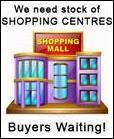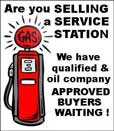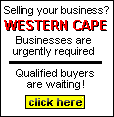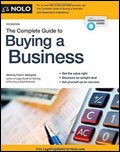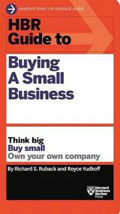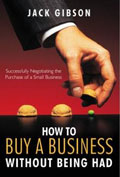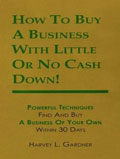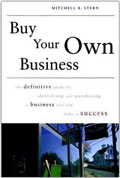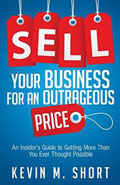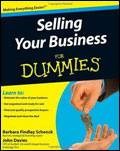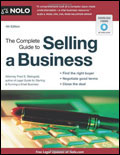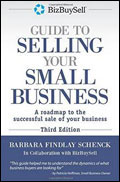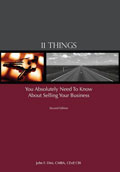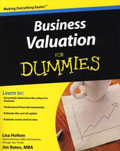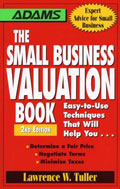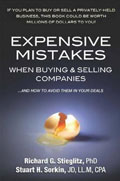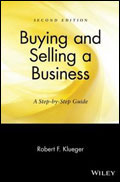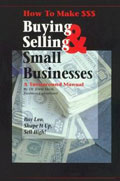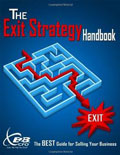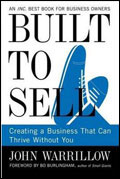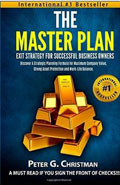
How To Sell Your Business
Do you really want to sell ?
Is this the right time to sell ?
Is this more than one business ?
Business Valuation - Setting the price
Are you owner selling - or using a broker
Creating the data information pack
Confidentiality and the negatives of the sale process
Finding the buyer
Make the sale happen
Financing the sale
| Do you really want to sell ? |
Perhaps an odd question - but it's amazing how many people cancel a sale offering after only a short period of listing. Too often they should not have listed in the first place and it was a hasty decision. The question to ask yourself is - what's your real reason for selling. And this is one that every buyer will want to know, but is probably not always answered honestly.
The most common (and acceptable) reasons are simple tiredness (or demotivation), retirement, health issues, relocation or a need to find time to concentrate on other ventures. You do not want to be concealing imminent business problems, product obsolecence, looming competition or an industry slump coming. If the reasons are negative, then they should be presented in such a way that a new owner would have advantages - such as a younger, energetic owner/manager who could drive marketing, travel and open a new branch.
| Is this the right time to sell ? |
The best time to sell is when your profits are increasing, turnover and income are consistent or improving, you have several strong contracts that overlap into the future and your customer base is both wide and many. Your industry should be in a boom phase and bank finance should be available. This is attractive to buyers and will give you your best price. Also, the general business sales market should be up, with more buyers than sellers.
It can sometimes take a year or two to get all the fundamentals right to prepare for a "best price" sale - but it would be generally be worth the effort for the higher price. Ironically, some sellers withdraw the sale once trading conditions improve without realising that chasing short term cashflow results in a missed opportunity for a much higher price.
We have an excellent article which we urge you to read : How to Prepare Your Business for a Future Resale.
Think seriously about not selling at this time if negatives are forcing a sale. Such factors could be poor profitability, staff losses, obsolete technology, new competition or a poor market projection.
| Is this more than one business ? |
Some businesses could realise more as two sales than as one. Such as if you had a manufacturing operation as well as a distribution business. A buyer may be put off by having to take on distribution, with no experience of that, while his skills are based in manufacturing. A new vehicle sales business could have rentals division and the two may have created synergy for the current owner, but are an unattractive combination for a buyer focussed on new vehicles only or car rentals only.
| Business valuation - Setting the price |
When setting a price you want to find a fair and achievable price that....
- will ensure a sale within a reasonable time and
- is not below real market value and
- can be justified to a buyer as to how it was determined.
The first step is to get a rough idea of the value. This will help protect you against third parties who might suggest a lowball price (to ensure a quick sale for their commission) or an unrealistically high price to induce you to give them a mandate. There are several internet resources on this subject which vary quite dramatically but we've summarised most of this at Calculating Your Business Selling Price. Either way, first get your own idea of a price.
You then need to check with with a valuator or appraiser. If you have an audit firm relationship, then they should be able to offer this service. There are qualified business people who hold themselves out to be specialists in this area and you should be given some form of documentation to substantiate their calculation. The higher the price, the more need for a professional valuation.
And if you are thinking of using a business broker to assist with the sale, then your broker selection process could include getting an indication price from the candidate brokers. This would give you a good averaging range and confirmation (or not) of your own estimate and the selected representative broker(s) would then formulate a more accurate and documented valuation.
What is very important, is that the pricing can become a deal breaker if it's poorly determined, and if you cannot justify the determination to the buyer. If you are an owner/seller then you would need to be able to discuss this rationally with the buyer. You also need a little wiggle room and negotiation space for adjusting for sale conditions. While a broker would usually handle this part of the sale, you still need the right price structure to facilitate the sale.
A final consideration applies where you are selling the business premises and property with the business. The buyer may want both (a security against leasing problems and the ability to make structural building changes) or may just want the business as property ownership could have its own investment risks. Perhaps the budget only stretches to buy the business and not the premises. You may even find the idea of holding onto the premises as attractive, if not for extra leverage related to funding the sale. In any event, you should consider a price for the business and a separate price for the premises. This would probably be addressed by the valuator/broker anyway.
| Are you owner selling - or using a broker ? |
First step is to explore a sale with the three most common buyers. An employee (or employee consortium), a competitor or a client of your auditors. These are usually the first people to hear about the possible sale and often end up being the buyer which is why many good businesses never come to market. You would need the assistance of a lawyer and accountant to structure and execute the sale and all will be good. But if a buyer is not found in these areas, you then have to decide if you will try and go it alone or if you will use a business broker. The advantage of the owner/seller route is that you will be paying no commission or broker's fee but you will be making some mistakes and what you may lose in opportunity or a lower price will probably exceed what you would have paid as a broker fee. That said, you can use the press, industry publications and web based services (such as BizForSale) to advertise the sale and, when the time comes, you may need the lawyers and accountant to finish things up.
But most sellers will go the business broker route. General broker services will cover pricing, preparing the documentation, planning the marketing, vetting the enquiries, ensuring confidentiality and introducing approved prospective buyers. You might be working on a flat fee or an agreed commission. The broker would probably want an exclusive mandate, which is usually time limited, and would generally be prepared to be more energetic and invest more effort into a mandated listing. Shared mandates limited to two or three brokers are not uncommon. This is the broker's world and they often have buyers on their books who may express interest and they also network with other brokers, some of which will specialise in handling your type of business. The challenge for you will be in selecting the right broker for your deal.
A listing of Recommended Business Brokers by Area is maintained on this website.
We suggest that you prepare a short document that explains the basic parameters of the business and your needs - which might be as simple as wanting a clean deal concluded within six months. You would invite the broker to contact you if they were interested in handling the transaction and you could then respond with a Limited Info Pack and a short questionairre.
We would suggest that the following questions could be asked:
- How long have you been active in business broking.?
- Is business broking your only activity.? If not please explain further.
- What would your marketing plan be for this sale.?
- What is your closing ratio.?
- Based on the Limited Info Pack data, what selling price would you suggest.?
- How many business listing do you have on your books and at what total value.?
- Can you provide me with a list of testimonials that can be authenticated.?
- What would be your proposed fee structure and mandate preferences.?
- What would be your expectations for a successful sale in terms of time.?
| Creating the data information pack |
The sooner you start start documenting the parameters of the business's operations and the statistics needed for the sale, the better. Many areas that need attention will be highlighed during this process which will cause you to systematically examine many different areas.
The most important single issues is a good audited three or four year set of financial statements with the corresponding tax returns and bank statements. This form the basis of the "financials" and will be the core indicator of the business's health and performance. A sale price will always be diminished if these financials are missing, incomplete or compromised.
Other docuentation will include:
- An asset list with costs, depreciated book values and estimated sale value.
- Property and equipment leases
- Technology use leases and licences
- Stock/Inventory listing at cost, at retail, and with ageing.
- Supplier contracts
- Customer contracts
- Customer listings
- Debtor analysis with ageing summary
- Product branding analysis and identifying differentiation
A staff analysis with years of service, functions performed and an assessment of core dependence. Consider this an inventory of human capital.
You will need to develop an "operating manual" of sorts which may come in several varieties - an executive summary, a detailed description of overall operations, and even a set of functional responsibilities of individual employees. This can be extended to include outside contractors and service providers to whom certain functions may be outsourced. For your company to look attractive to a buyer, you need to show that income is stable and growing, the income stream comes from several diverse sources, the customer base is wide and healthy and that the staff are well trained and unlikely to desert.The documentation needs to support this.
Weaknesses and vulnerabilities should also be addressed as this lends extra credence to positive reporting by introducing balance and a sense of transparency and full disclosure. This will help reassure the buyer and build trust with the seller.
This documentation could include:
- A SWOT analysis. (strengths, weaknesses, opportunities and threats)
- An assessment of business risk
- The cost of the absent owner
The importance of the current owner to the customers will always be an elephant in the room and it is best that this is presented up front and openly. The buyer will fear that the customers will turn to other alternatives and the income will fall once the sale is made public. The seller should allay those fears by explaining why this should not happen and even suggest strategies to work against this. These could include client introductions, endorsements of the buyer and a continuing (if limited) consulting role for the seller. A strong management team, for bigger operations, usually minimises this problem.
| Confidentiality and the negatives of the sale process |
There are some inherent dangers that can effect your business during the sale process. You could be releasing trade secrets and business information to outsiders who could use that in competition, Your existing competitors could spread the information that you are up for sale for various reasons which could make your customers nervous, And if your staff were aware of a pending sale that could cause job insecurity and induce employees to start looking for other positions. So you need to keep it quiet and keep the fact tight.
All prospective buyers should be asked to sign a Non-Disclosure Agreement (a NDA) which would prohibit them from disclosing your business information or using it themselves. This is standard procedure with business sales and the NDA is sent to a buyer when they make their first enquiry in exchange for the Limited Data Pack information. It often deflects the tyre kickers as well.
One has a different relationships with different competitors and you would need to select those that would be likely candidates and are unlikely to respond agressively. If they show interest then the NDA completion would be imperitive before any data is shared. Go carefully with this one.
Senior employees would need to be consulted at some time so perhaps the earlier the better. They should feel that they are getting the right of first refusal and you need them hard on your side as their continued service with the company would be a major plus in the sale package. Emphasise at all times that their job security is a paramount concern. It would be difficult to give a prospective buyer access to the physical premises and still conceal the sale situation from key staff - so best go the open disclosure route than risk the issues that will come from an exposed betrayal, Try to find factors where new ownership could be beneficial for the staff.
| Finding the buyer |
Consider your employees.
The staff know the business well - perhaps even better than you do. They like the idea of ownership as that gives them greater sense of security. Many business studies have proven that productivity increases dramatically when employees become owners.
Competitors are often in the market - they just don't know it until you approach them.
There are many advantages for a similar firm: efficiencies in scaling, accessing a new geographic area, being able to reduce competition, immediate access to your clients, combining technologies and more.....
Advise your auditors of your selling intentions. They are disceet by nature and can approach likely buyers (who may be competitors) in such a way as to protect your confidentiality. They could also seek out buyers in other major city and industrial areas due to their nationl footprints. They are becoming more active in business broking areas as they expand and diversify their activities.
With smaller businesses, and especially those that are geographically limited (determined sometimes by licence or the nature of the product or service), it is clearly better to use a locally based business broker who knows the local market. The broker's networking contacts and access to local advertising means that they can cover the local market more efficiently. A buyer is less likely to relocate for a smaller business than for a major acquisition.
If it seems that a buyer will most probably be from another centre, or possibly even from outside the country - then know that advertising via the internet has become the most widely used medium. You can usually list on several websites to maximise the chances of generating these enquiries and a simple search on Google.com (NOT Google.co.za) should reveal the more visible players. Your broker should be familiar with these methods.
| Make the sale happen |
Tidy up, pretty up and fix what's broken. It's common sense that neat and smart premises and plant convey a sense of efficiency and good maintenance. Deal with tatty furnishings and machinery that needs sprucing. Records should be easy to find and there should be a general sense of organisation and control by systems. New paint always works wonders.
Don't waste your time on unqualified buyers. They need to wilingly sign the Non-Disclosure document and provide evidence as to how they would fund the purchase. It is not impolite to ask for proof of unencumbered funds and evidence of approved finance. Don't sell to the wrong person - the buyer needs to be successful. You don't want a business failure that compromises employees and strands the customers you gave assurances to. This could also collapse the sale as you may have extended seller financing and there could be claims of misrepresentation and patent defects from a panicking buyer. When assessing the buyer check that they have acess to adequate working capital, are aware of seasonal demand, have reasonable business skills, suitable experience, leadership skills and are strategic thinkers. Too many negatives there could spell impending trouble.
Don't expect a quick and clean sale. It is rare to happen quickly. A business sale will take between six months and two years.
Once you have prospective buyers, keep the sale alive and moving forward. If a buyer shows genuine interest you need to keep the momentum flowing without suffocating them.
Keep taking backup offers. You should expect deals to flounder on unexpected points, and the next buyers can then get more focussed attention. You may be running several negotiations at the same time. Do not kill the advertising until you have a signed and deposit-paid buyer in the bag.
Be aware of the deal breaker and deal maker issues which can be used to ease the sale through and reach sale closure.
The DEAL BREAKERS are the ones to anticipate and prepare for.
These include:
- Technology aversion and a lack of confidence.
- Lack of required qualifications. ie Real estate accreditation, pharmaceuticals, etc
- Relocation of the owner.
- Relocation of the business.
- Transferability of leases, licences and other rights.
DEAL MAKERS can remove obstacles and increase momentum towards closing the sale.
These include:
- Be prepared to remove and retain the debtor's book from the sale.
- Offer the handover period and ongoing assistance for the new owner.
- You may have to settle the outstanding creditor payments.
- Providing some proof that key staff are aware of and support the sale.
- Evidence that customers are brand aware and even brand loyal, if not advocates.
- Be willing to enter into a Restraint of Trade agreement.
| Financing the sale |
While an ideal buyer will come up with 100% of the asking price in cash - you need to know that this is a rare animal indeed.
The majority of sales in the R200 000 to R2 million range incorporate an element of seller funding. A buyer would be suspicious of the business's sustainability if the seller is absolutely non-negotiable on the point. And all of this happens even when the buyer pre-qualified on availability of finance.
A substantial non-refundable deposit (covering business damage) can be negotiated with the business itself put up as security for non payment of the agreed installments. There can be turnover clauses that define those installments which are not unreasonable given that the buyers wants to control and minimise risk. If other securities can be offered into the package then this can often be a viable option.
Related Resources :
Buying a BusinessHow to Buy a Business
Restaurant Internet or Online Retail Manufacturing Service
Wholesale / Distribution Service Station / Convenience Store Liquors
Conducting a Due Diligence on Buying a Business
Selling a Business
Preparing Your Business for a Future Sale
How to Sell Your Business
Determining a Realistic Selling Price for Your Business
General Topics
Financing Sources for your Business Purchase
How to Choose a Business Partner

|
Anything we left out, stuff you don't agree with.? Good article, bad article.? Please give us your comments and suggestions. |

